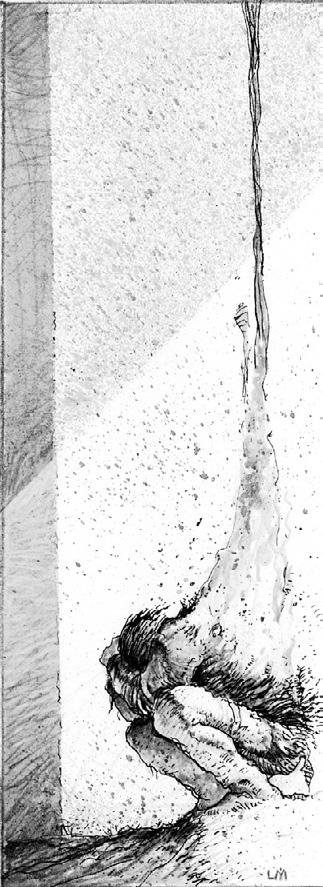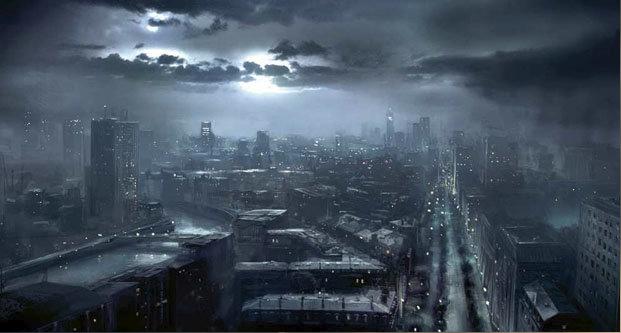
While Kindred carry many gifts and advantages, their Requiems are far from blessed. Vampires suffer numerous banes. Collectively, Kindred all suffer from the “great banes”: fire, sunlight, and stakes through the heart. In due time after the Embrace, vampires suffer the banes of their clans. All Kindred feel the pull of the Beast, which tempts them into violence. Torpor drags them to lengthy slumbers. As the years pass and they fall away from humanity, Kindred develop other, unique banes.
The Pain of Purity: Sunlight
Sunlight represents truth and honesty. It stands for visibility, where Kindred exist in the deceptive darkness. While it isn’t always immediately deadly, it burns Kindred flesh. The Lancea et Sanctum attributes this to the judgment of God, as potent Kindred and particularly monstrous vampires burn hotter and faster than young, humane Kindred. Damage taken quickly looks like a normal burn; the flesh chars, sears, and smokes. Damage taken slowly looks more like decay, as the flesh sloughs off with time.
When sunlight strikes Kindred, the rays begin to decay and burn their flesh. Their Humanity dots determine the intensity of the damage, and their Blood Potency dots determine how quickly they disintegrate.
A character can avoid damage from sunlight only with complete coverage from its rays. If she only exposes her eyes, for example to run for shelter, consider her Blood Potency one step lower. Depending where in Paradi City a vampire is, exposure to sunlight can be difficult for hunters or enemies to manage.
The Pain of Knowledge: Fire
Fire represents humankind’s dominance over the natural world, and ability to manipulate its environment as a tool. This symbolically human tool destroys Kindred flesh like nothing else. The Circle of the Crone believes fire burns as a lesson to Kindred, reminding them from whence they came, and can never return. Most Kindred just acknowledge that it could mean Final Death within moments, and avoid it at all costs.
Fire automatically inflicts aggravated damage per turn of exposure (no attack roll is required). The larger the flame, the more harm that’s inflicted. The hotter the flame, the greater the injury. Mortals take only lethal damage. Each turn, a vampire may turn a number of aggravated damage levels to lethal levels equal to his dots in Resilience.
A Stake to the Heart
When a wooden stake penetrates the Kindred heart, the vampire immediately enters torpor. Unlike normal torpor, he awakens immediately upon the stake’s removal, but not before. To target the heart, make an attack roll with a –3 die penalty after factoring Defense. If the attack causes five points of damage, it penetrates the heart.
Any wooden object can paralyze a vampire in this way. An expertly shot arrow is as capable as a Van Helsing-inspired block of wood. The object must be long enough to completely pierce the heart and remain lodged in it. Only wooden objects achieve this effect; a fiberglass crossbow bolt to the heart will damage a vampire but not paralyze them.
Clan Banes
The five lineages of Kindred each carry affinities for certain Disciplines. This gives them advantages others may not have access to. On the other hand, each clan also has a bane, a particular aspect of the curse that only affects their familial line.
Clan banes do not affect a vampire until she reaches six dots of Humanity. They do not go away if she regains her seventh dot; they remain with her throughout the rest of her Requiem.
- Daeva: The Wanton Curse
Daeva immerse themselves in the mortal world; it not only feeds them, it compels them. When Daeva choose vessels, they become obsessed. When they drink from a mortal once, they’re fine. On their second and further drinks from the same source, roll Humanity. Failure causes the Persistent Dependent Condition toward the mortal. The Condition only goes away with the mortal’s death. For this reason, Daeva tend toward either remarkable promiscuity, or they cultivate massive harems and herds.
- Gangrel: The Feral Curse
Gangrel Beasts boil close to the surface. A Gangrel can run with the devil inside her, but has difficulty fighting it. All her dice pools to resist frenzy are limited by her Humanity dots. This weakness does not affect dice pools to ride the wave.
- Mekhet: The Tenebrous Curse
Mekhet blood is the blood of shadows. Their Requiem is one of secrecy and symbolism. For this reason, Mekhet each suffer a single bane that is not tied to a breaking point. When the Mekhet reaches Humanity 6, choose a bane (see below for examples). This bane counts toward the three banes a vampire is allowed, so a Mekhet is less able to mitigate detachment. As well, consider a Mekhet’s Humanity to be one dot lower for all Humanity-based banes (including sunlight and torpor).
- Nosferatu: The Lonely Curse
Nosferatu embody fear, disgust, and all manner of uncomfortable feelings. Some are inhumanly ugly. Some have a gaze that makes a person feel violated. Every Nosferatu has something that stands in the way of normal relationships. When dealing with humans, treat the Nosferatu’s Humanity as two dots lower for the purpose of Social penalties, and treat any Presence and Manipulation failures as dramatic failures. This bane does not apply to interactions with Touchstones or Kindred.
- Ventrue: The Aloof Curse
The Ventrue are confident. Why wouldn’t they be? They’re clearly superior. This attitude frequently causes Lords conflict, as they treat all those around them as objects. When creating a Ventrue, apply his first Touchstone to his seventh dot of Humanity. This means his first Humanity loss will also detach that Touchstone as the bane takes effect. Further Touchstones may fill his sixth through second dots.
Banes
When Kindred hit certain points in their detachment, they can turn their monstrosity inward, growing spiritual scars over their emotional wounds. When losing Humanity, a character can take a bane and a Beat. If he does so, he becomes unable to lose Humanity from that particular breaking point again. However, each bane causes a –1 die penalty to further detachment rolls, which speeds the Requiem’s downward spiral.
A character may only have three banes. You may choose from the sample banes below, or create your own. As a rule, most banes use Humanity as part of their mechanics, and can affect Vitae or cause bashing damage. Sometimes, they use the inverse of Humanity, expressed as (10 – Humanity). Many banes provoke frenzy. A vampire cannot use more dice to resist a bane-provoked frenzy than she has Humanity dots.
Banes are a player choice, but vampire characters themselves do not choose them or the transgressions they affect.
- Bells: Your character cannot stand the sound of bells, and it causes intense pain. This only happens in the presence of actual bells; recordings will not cause pain. Each minute she’s exposed to the sound of bells, she takes (10 – Humanity) dice worth of bashing damage, and is provoked to frenzy. Some vampires manifest this bane in response to hymns instead of bells.
- Blood of the Unwilling: Your character takes no sustenance from the blood of the unwilling or the unknowing. When feeding from an unwilling vessel, she gains no nourishment from the first few Vitae taken. This amount is equal to (10 – Humanity).
- Crossroads: Your character is confused when he knowingly passes through a crossroads. For the remainder of the scene, all his dice pools are capped by his Humanity dots.
- Face of Hunger: When your character finds himself hungry, it shows on his face and on his skin. His eyes grow red, and his skin pulls tight over his visage. He looks every bit the corpse. When he has less than five Vitae, his Humanity dots act as a cap on all his Social actions. Humanity also caps all dice pools to resist frenzy inspired by hunger.
- Grave Soil: Your character is tied to the soil of her place of death. If she does not sleep with at least a handful of dirt from her region of death, all her dice pools are capped by her Humanity for the next night.
- Hated by Beasts: Animals despise your character. They’ll put their backs up defensively, growl, hiss, or boast. Any attempts to deal with animals through Animal Ken or Animalism suffer a (10 – Humanity) penalty.
- Holy Day: Your character holds one day of the week holy. She cannot resist the daysleep, and cannot awaken during that day unless her body suffers damage equal to 10 – Humanity.
- Invitation: Your character cannot enter a private dwelling uninvited. If he does, he suffers bashing damage equal to (10 – Humanity). He cannot heal the damage as long as he remains inside.
- Open Wounds: Your character’s wounds stay open until she sleeps. She can heal Health levels with Vitae, but the wounds do not close until she’s undergone daysleep.
- Plague of Purity: Your character finds the pure of heart to be utterly repulsive. Any touch by a human with Integrity 8 or higher causes (10 – Humanity) bashing damage.
- Rat King/Queen: Your character attracts vermin. She’s always surrounded by rats, flies, cockroaches, or other creatures of plague. This causes discomfort and disgust in most mortals, causing her to fail any Social roll not related to the Intimidation Skill. She can send the vermin away for a number of minutes equal to her Humanity score with a Willpower point.
- Repulsion: Your character finds a certain substance abhorrent. Choose this when taking the bane, but it should be something that is likely to appear in many homes. For example, garlic, salt, roses, or silver are all valid repulsions. She cannot come closer than (10 – Humanity) feet from the item without spending a point of Willpower. As well, if the object of repulsion enters a wound, it causes (10 – Humanity) dice of bashing damage.

